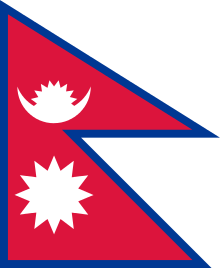Gopal Yonzon
| Gopal Yonjan | |
|---|---|
| Native name | गोपाल योञ्जन |
| Born |
August 26, 1943 Darjeeling, Bengal Presidency, British India |
| Died |
May 20, 1997 (aged 53) Delhi,India |
| Genres | Modern music |
| Occupation(s) | Singer, musician, playwright, editor |
| Instruments | Vocal |
| Years active | 1960–1990 |
| Associated acts | Narayan Gopal, Aruna Lama |
Gopal Yonzon (Nepali: गोपाल योञ्जन) (August 26, 1943 – May 20, 1997) was a prominent popular singer and composer of Nepali music. He was also known for his Patriotic Nepali songs. His voice range allowed him to sing songs of every genre of Nepalese music. He belongs to the first generation of Nepali singers who became professional singers. His songs have also been used in several movies and dramas across the country.
Early career
Gopal started his musical career as a flautist. He wrote his first lyrics in 1963 and his first musical composition was recorded in 1964. His musical works encompass nationalistic/patriotic, spiritual, romantic, philosophical, dancing tunes, ballads, musical compositions, ode to women and womanhood, songs for children and youth and thematic songs on environment, sports, scouts, etc. The list is endless. His renderings range from purely classical to folk, modern and music specially created for women and children. In all this variety he maintains his sensitivity and finesse in captivating and maintaining the Nepali touch.
Association with Narayan Gopal
With the partnership of a famous singer Narayan Gopal during the later sixties, Narayan Gopal's music entered a new phase in which he began to write about love, loss and tragedy. In the words of Ishwar Bhallav, Narayan Gopal became the singer of the hearts of the Nepali people.Rafi's association with Gopal Yonzon helped the more establish himself as one of the most prominent singers in Nepali music history. It was also at this time that new sounds from the West, such as by the Beatles and Bob Dylan, were entering and influencing the music of Nepal. In order to confront the influence of Western pop music, a new consciousness and a new style of music was necessary. To meet these challenges, Narayan Gopal in partnership with Gopal Yonzon created songs that continue to be popular in Nepal. Songs like बिर्सेर फेरि मलाई नहेर, चिनारी हाम्रो धेरै पुरानो, तिम्रो जस्तो मुटु मेरो पनि, लौ सुन म भन्छु मेरो रामकहानी not only gave new lease of life to Gopal Yonzon's musical career, but it also carved a special niche for Narayan Gopal among the listeners of Nepali music.[1]
Personal life
Gopal Yonzon was born into a Tamang family in Darjeeling, Bengal Presidency, British India, on August 26, 1943 (10 Bhadra, 2000 B.S.). Later in 1962 he joined the Darjeeling Art Academy as an instrument player. In 1967, he moved to Nepal from Darjeeling for his BA in Nepali Language. He married Renchin in 1968. Gopal Yonzon died in Delhi, India from complications of Jaundice during treatment on May 20, 1997 (19 Mangsir, 2051 B.S.) at the age of fifty-one. He had one daughter and two sons.
Musical style
To Gopal Yonzon, the most important part in the art of modern songs were: melody, lyrics, and the singer. This did not rule out other aspects, however. Chords, he said, are required to put life in the music, but the chord progression is part of the arrangement, not something to base the composition of the melody on. When the melody is composed, the arranger will make the progression from the melody. Without a good arrangement, Gopal said, a song will be like a curry without salt or other spices.
The aspects of this recipe at work included non repetitive melodies moving over the accompaniment in short, repeated rhythmic figures; heterophony, countermelodies, chords, and harmonic progressions; one melody for refrain, another for the verse, and then—as part of the arrangement—melodies for the instrumental interludes marking off the sung sections.
Honors
 Order of Gorkha Dakshina Bahu III - 1994
Order of Gorkha Dakshina Bahu III - 1994 Coronation Medal of Nepal - 1974
Coronation Medal of Nepal - 1974
Awards and recognitions
- Best Musician – Flautist(Darjeeling) - 1962
- Best Musician – Flautist(Darjeeling) - 1963
- Best Musician – Flautist(Darjeeling) - 1964
- Best Music Director(Darjeeling) -1965
- Best Music Director(Darjeeling) -1966
- Best Music Director(Darjeeling) -1967
- Radio Nepal Gold Medal for Best Music Director/Composer (Nepal) -1968
- Lions Club Award for Best Music Director (Nepal) - 1986
- Best Music Director Nepal by Royal Nepal Film Corporation -1988
- Urvashi Award for Best Music Director Nepal -1990
- Chinnalata Award for Outstanding Contribution to Nepali Music -1992
- Priya Award for 25 years dedicated outstanding contribution to Nepali music -1995
Publications
Author
- Sangeetanjali – Music Course Book for Intermediate College
- Geet Manjari - Book & Tape for songs for children up to the age of 10
Contributor
- Music & Dance Section of the Rough Guide on Nepal by David Reed
Editor
- BAAGINA Publication: BAA for Baja meaning Music GI for Geet meaning Song & NA for Naach meaning Dance
References
- ↑ , Remembering Gopal Yonjan.